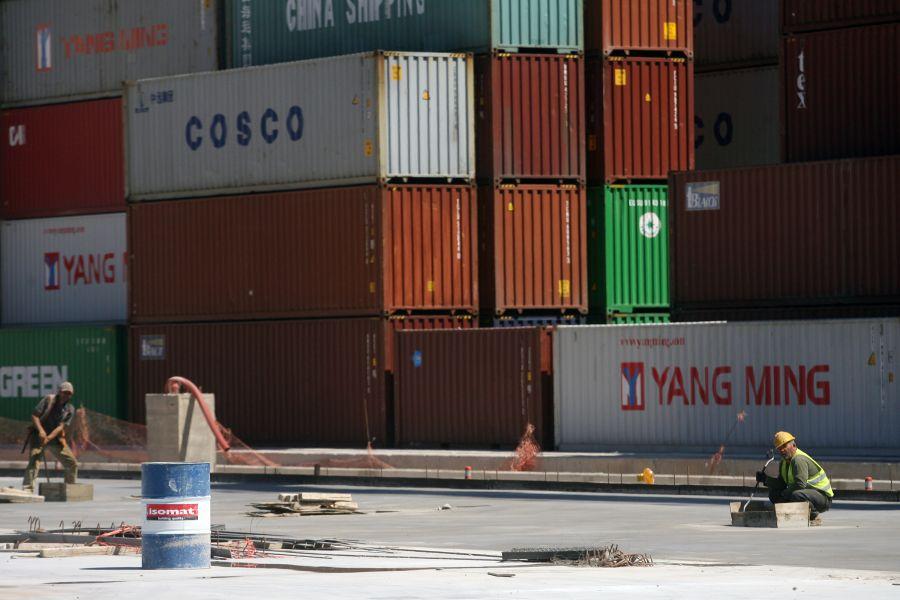BEIJING, Nov. 23 (Xinhua) -- For the global shipping giants, 2016 may be a year full of challenges after the financial crisis in 2008.
In September this year, the Republic of Korea (ROK)'s Hanjin Shipping Co., one of the world's largest container shipping companies, filed for bankruptcy protection.
In October, the reshaped China COSCO Shipping Corporation Limited said that it incurred a loss of 9.22 billion yuan in the first three quarters of the year.
In early November, the world's largest container shipping company, Maersk Line, announced that its shipping section suffered a loss of 122 million U.S. dollars actually in the third quarter, representing a loss for the second consecutive quarter.
Under such circumstances, Philippe Louis-Dreyfus, chairman of the Baltic and International Maritime Council (BIMCO), urged members not to build new bulk cargo ships as he pointed out that the market was terrible.
As the globally largest shipping organization, the BIMCO's members have 15,000 ships, accounting for more than 65 percent of the world's total shipping capacity.
"In the past eight years since the financial crisis, the global economy has recovered slowly. However, the shipping industry has not and still been in trouble at present. There is a problem in the self-regulation and the market lacks the self-discipline," said Ye Weilong, deputy general manager of the China COSCO Shipping Corporation Limited.
The obvious problem of the self-regulation is the big expansion in the global shipping capacity. In the period from 2011 to 2015, annual investments in ship building in the shipping industry had exceeded 100 billion U.S. dollars. The persistent expansion in the shipping capacity has led to the severe imbalance between supply and demand.
At the beginning of the year, the Baltic Dry Index (BDI) and the China Containerized Freight Index (CCFI) both fell to record lows and hit 290 points and 632 points, respectively.
Unlike other industries, a cycle is required in the shipping industry from the ship building to release of the shipping capacity. From this perspective, the supply-side reform in the container transportation industry is just beginning. Although the Hanjin Shipping's application for bankruptcy protection, its shipping capacity still exist and will not change the supply-demand pattern in the long run, said Jiang Ming, a researcher of the Essence Securities.
For example, at the beginning of the year, the China Ocean Shipping (Group) Company (COSCO) and the China Shipping (Group) Company merged to become the China COSCO Shipping Corporation Limited, an iconic event in the shopping integration.
Subsequently, Germany's Hapag-Lloyd and the United Arab Shipping Company signed a merger agreement. Japan's Kline Ltd, Mitsui O.S.K. Lines, and NYK Line agreed to consolidate their container transportation businesses next year.
The shipping enterprises shall more deeply adopt the model of "sharing economy", including sharing of ships, containers, and shipping space, and joint operation of tankers and dry bulk cargo transportation market, said Xu Lirong, chairman of the China COSCO Shipping Corporation Limited.
Besides spontaneous market adjustment, shipping policies in China have also improved. For example, the Shanghai free trade zone became the first in the country to launch a series of opening-up measures including foreign ship management, and international transit LCL.
Meanwhile, the China-proposed Belt and Road Initiative will also bring opportunities to the shipping enterprises. Lots of infrastructure investments will effectively make up for weakness of some countries along the Belt and Road routes in infrastructure, stimulate local economic development and fuel potential of the trade growth. Therefore, the shipping enterprises can take it as a chance to open up new routes, enhance sea transportation connectivity of relevant regions, and realize win-win results of enterprises and regional economies, said industry insiders.
However, the shipping industry still has a long way to go before the above plays a role.
"The dry bulk cargo transportation market will likely embrace a turnaround until 2019", said Liu Qianwen, vice president of Elane, a shipping big data company.
The shipping industry will recover truly until no one talks about the recovery, according to Guo Fangmeng, executive general manager of shipping finance department, ICBC Leasing.
(Edited by Hu Pingchao, hupingchao@xinhua.org)
(This information was firstly published in Belt and Road Weekly newsletter on Nov. 18, for subscription to get more timely updates, please contact us at silkroadweekly@xinhua.org)




 A single purchase
A single purchase









